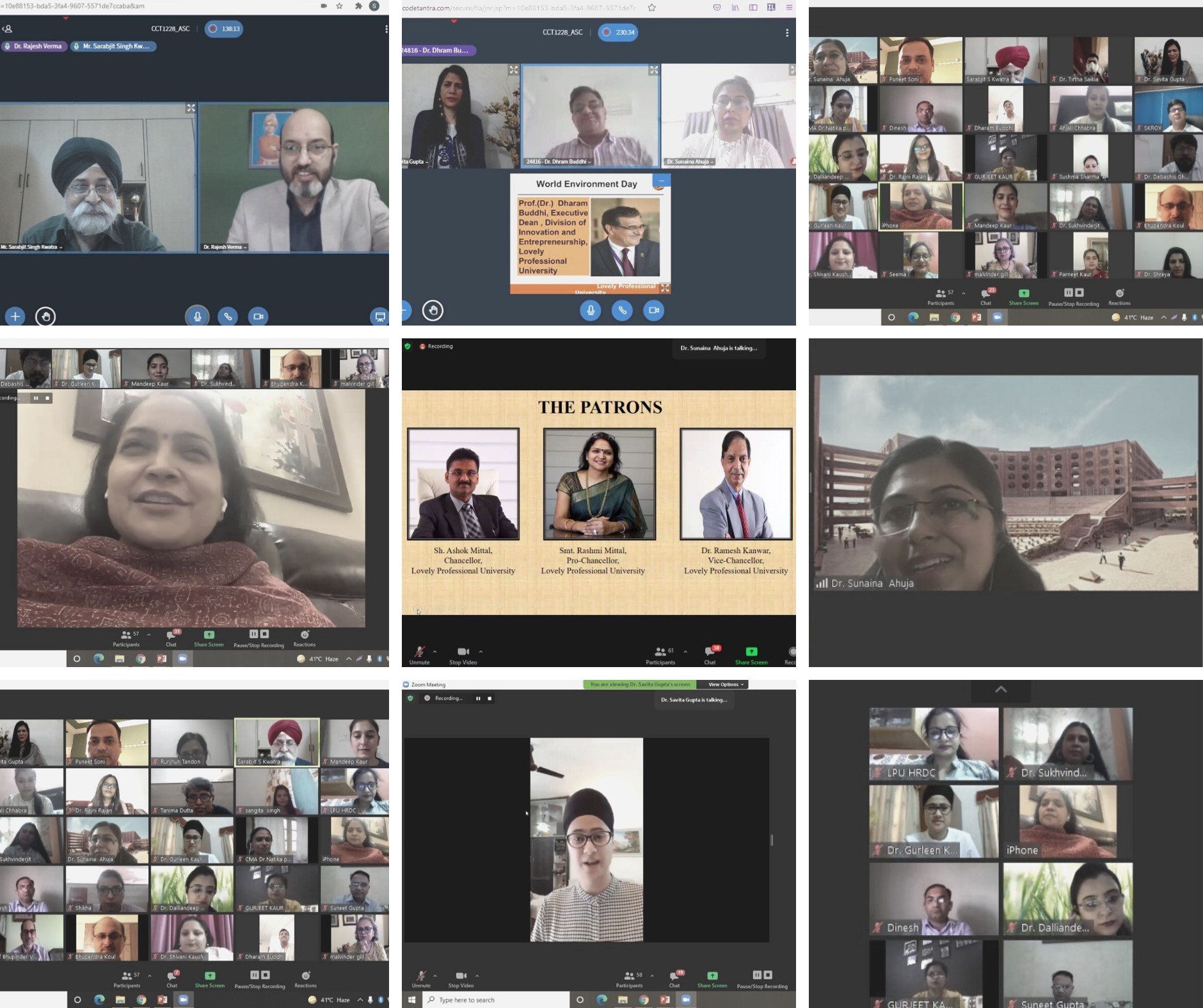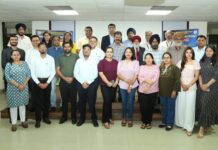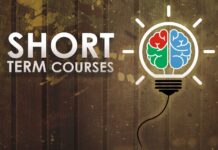“Live as if you were to die tomorrow. Learn as if you were to live forever.” ― Mahatma Gandhi
Teacher education is the pivot around which the entire education system revolves. It is the teacher who translates educational policies into practice and programmes into action. Education is a service enterprise upon which all other sectors of the economy depend. The importance of education in life is immense. It facilitates quality learning for people throughout their life. It inculcates knowledge, belief, skill, values and moral habits. It improves the way of living and raises the social and economic status of individuals. Education makes life better and peaceful. It transforms the personality of individuals and makes them feel confident.
Well said by Nelson Mandela, “Education is the most powerful weapon to change the world”. It is the foundation of the society that brings economic wealth, social prosperity and political stability. It gives power to people to put their views and showcase their real potential. It acts as an integrative force to foster social cohesion and national identity.
The LPU-HRDC‘s main philosophy is to keep in mind that the teacher is central to the system. LPU-HRDC outcomes are focused on continuous improvement in quality of teaching and evaluation as per international standards, continuous improvement in research as per global standards and increase in work efficiency. The Guru-Dakshta: Faculty Induction Program has been organized w.e.f. May 03, 20201 to June 07, 2021 for 53 participants from 16 Higher Educational Institutions across India.
Week 4 & 5 of Guru-Dakshta: Faculty Induction Program (FIP) were structured as per Module V, VI, VII, VII, IX & X prescribed in UGC Guidelines, 2019 in Guru-Dakshta manual. Hence the sessions targeted
- M5: Personal-Emotional Development and Counselling
- M6: Research, Professional Development and Academic Leadership
- M7: Academic Integrity
- M8: Constitutional Values, Human Rights & Fundamental Duties
- M9: Environmental Consciousness and Sustainable Development Goals
- M10: Strategic Planning and Management
The fifth module titled “Personal-Emotional Development and Counselling” targeted strengthening emotional intelligence and counselling skills amongst the participants, a competence most required in the prevailing circumstances of combatting the global pandemic – Covid-19. This module enabled the participants to enhance their skill of dealing effectively with different types of personality, learn to deal and manage stress among the learners and to counsel the learners effectively.
Dr. Sunaina Ahuja, Professor and Associate Dean, Head-HRDC, Lovely Professional University deliberated on Developing Emotional Intelligence and Work Engagement and Work-Life Balance in Higher Education. Dr. Ahuja elaborated upon:
- Significance of Emotional Intelligence in present times
- The IMPACT of Emotional Intelligence on the society
- The need for Work-Life Harmony
- 6 ways to achieve work-life harmony
Ms. Malvinder Gill, Dy. Dean, Division of Student Relationship, Lovely Professional University explained on Student Counselling for Academic and Social Adjustment. She elaborated on the concepts of adjustment with examples of adjusting in day-to-day life.
Ms Saloni Kalra, Art of Living Faculty, State Teacher Coordinator of Punjab and Chandigarh and Mr. Vivek Vansal, Art of Living Faculty, State Teacher Coordinator of Punjab and Chandigarh focussed onhighly effective educational and self-development programs and tools that facilitate the elimination of stress. To foster deep and profound inner peace, happiness, and well-being for all individuals.
Prof. O.P. Katare, UIPS, Panjab University, Heartfulness Meditation Trainer deliberated on Life Skills for Sustainable Future encompassing a broad range of personal, interpersonal, psychological, social and cognitive skills.
The sixth module titled “Research, Professional Development and Academic Leadership” provided essential knowledge on the use of acquiring research skills, leadership qualities and facilitating one’s own professional development. Dr. Vijay Chechi, Professor & Head Department of Education, Lovely Professional University focussed on:
- Understanding of nature, process and review of related literature in research
- Understanding about various types of research.
- Analyse the different tools for data collection
- Use ANOVA (One way, Two Way and Repeated Measure)
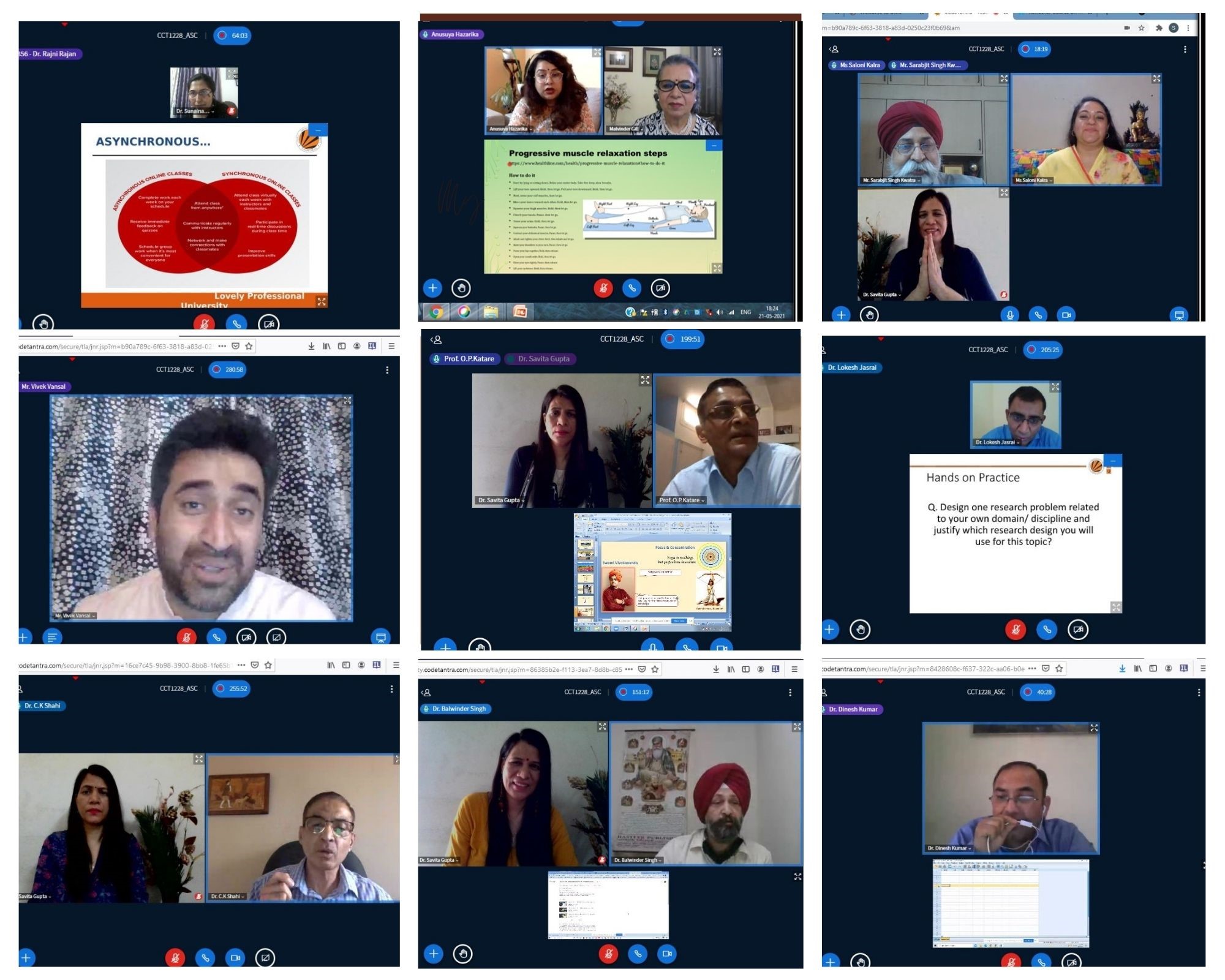
Dr. Lokesh Jasrai, Associate Professor, Mittal School of Business, Lovely Professional University deliberated on Important aspects of Research Design, Research Methodology, Scale Development and Data analysis with SPSS: t-test focussing on:
- Understanding of research design
- Descriptors of research design.
- Types of research designs.
- Relationships between variables and the steps for evaluating those relationships.
- Importance of research methodology.
- Developing skill to design research methodology.
- Ability to use sample design process for data collection.
- Process of scale development.
- Demonstration of Reliability analysis
- Understanding t-test design.
- Major Assumptions of t-test.
- Types of t-test and their use in research.
- Ability to conduct data analysis using t-test.
Dr. Chander K. Shahi, Dean, Faculty of Graduate Studies & Professor, Faculty of Natural Resources Management, Lakehead University, Canada contemplated upon Recent Trends in Academic Research and Consultancy. He skilfully crossed through the thought process of the participants and giving them food for thought on ‘Recent Trends in Academic Research and Consultancy’ and updated them on need based application of IoT, AI, Augmented Reality, Industry 4.0, Blockchain and Nanotechnology to resolve the existing encounters.
Dr. Balwinder Singh, Professor, University School of Financial Studies, Guru Nanak Dev University, Amritsar oriented onConceptual and Practical Understanding of Quantitative Data Analysis Techniques. He explained the participants about the Hierarchy of Data, Scales of Measurement using case study method and open source software JAMOVI.
Dr. Dinesh Kumar, Associate Professor, Department of Education, Lovely Professional University oriented the participants onData Analysis with SPSS: Introduction with Interface with a learning outcome to enter & transpose data in SPSS sheet, describe data with the help of descriptive statistics through SPSS, select appropriate graphs for given data, construct univariate & bivariate/multivariate graphs and interpret graphs in research publications
Dr. Sanjay Mishra, Professor, School of Physical sciences and Engineering, Lovely Professional University oriented the participants on Software for Reference Writing and Bibliography using Overleaf and WinEdit.
Dr. Rahul Sharma, Associate Professor, Mittal School of Business, Lovely Professional University deliberated on Qualitative Research. The participants were curious to learn usage of NVIVO software, which would help them to analyze the qualitative data.
Dr. Savita Gupta, Professor and Head Deptt. of Faculty Development, HRDC, Lovely Professional University disseminated on Caste, Class and Gender in the Classroom-Examining Bias in Teaching and Research and solution to the problem with varied activities.
Dr. Dhram Buddhi, Professor and Executive Dean, Division of Innovation and Entrepreneurship, Lovely Professional University focussed onIntroduction of Patents and Its Uses for Research Scholars and Students.
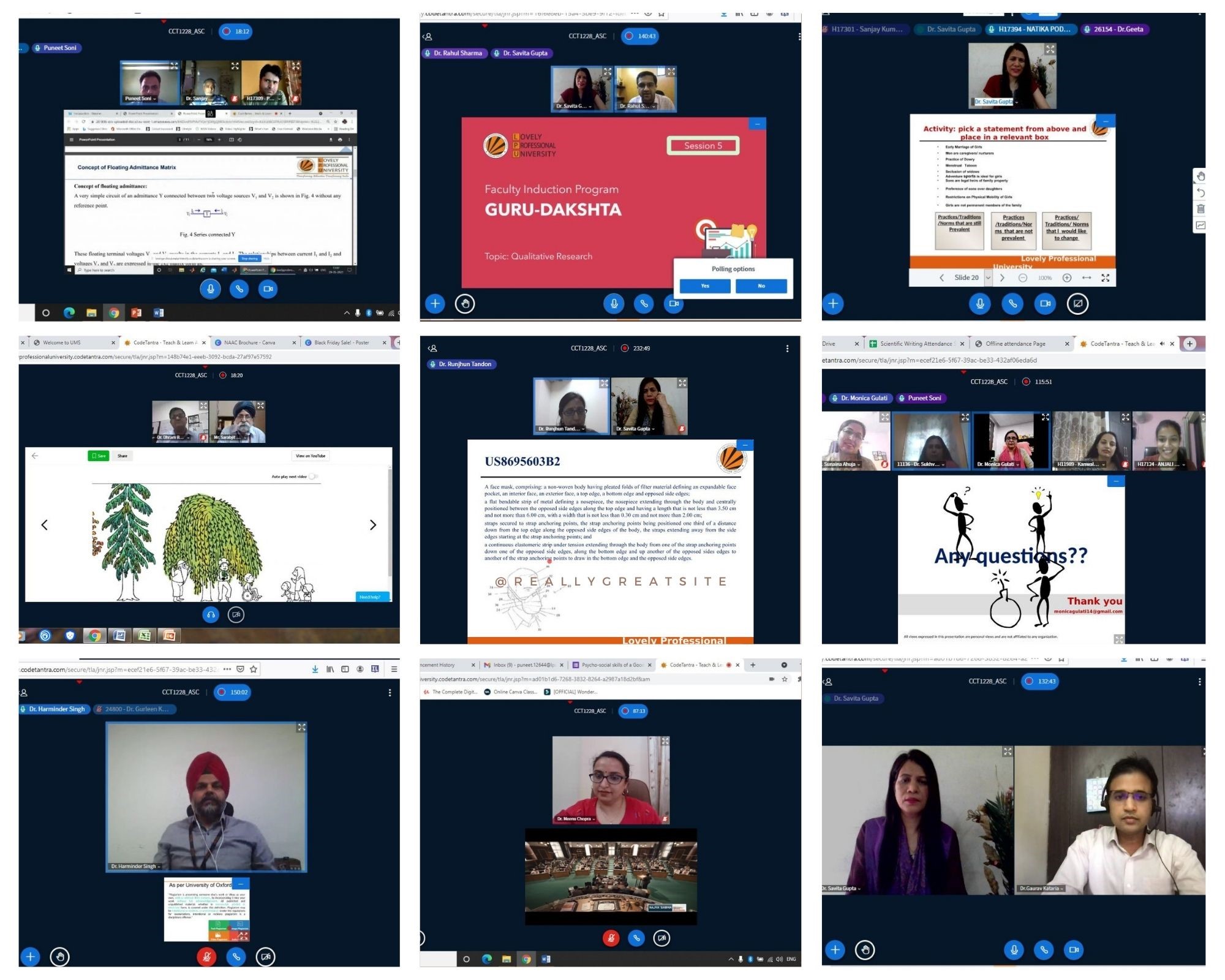
Dr. Runjhun Tandon, Associate Professor & Asst. Dean, Division of Research and Development, Lovely Professional University oriented on Management of Intellectual Property Rights for Academicians and Patent Strategy: Filling a Provisional Patent Application. Major focus was on:
- Intellectual Property Rights
- Patents
- Copyrights
- Trademarks
- Databases for IPR research
- Trade Secrets
- Do’s and Don’ts
The seventh module titled “Academic Integrity” provided insights on academic integrity among participants to have a trustworthy and high quality academic outputs from higher education institutions. Dr. Monica Gulati, Professor and Sr. Dean, Faculty of Applied Medical Sciences, Lovely Professional Universitydisseminated on Academic Integrity: The Best Practices. She discussed the role of faculty in imparting values among students, Safeguarding academic integrity, identifying the predatory journals, ethical practices while conducting research, plagiarism etc.
Dr. Harminder Singh, Professor & Assistant Dean, Department of Accreditation and Rankings, Lovely Professional University oriented the participants on Plagiarism Types, Issues and Consequences and Software Tools for Plagiarism Check: Turnitin and Open Source Tools.
The eights module titled “Constitutional Values, Human Rights & Fundamental Duties” sensitize on understanding the linkage between Constitutional values, human rights, fundamental duties and education, Appreciate the importance of methods and strategies to integrate Constitutional values and in classroom teaching and research. Dr. Meenu Chopra, Associate Professor, School of law, Lovely Professional University exchanged her views and experiences onConnect Between Constitutional Values and Education with focus on:
- Concept of Constitutional values and Education in class
- Understanding the basics of Constitution
- To relate Constitutional provisions with the education system
- To apply the constitutional values in their classes
Dr. Gaurav Kataria, Professor, School of law, Lovely Professional University focussed onHuman Rights and Fundamental Duties. He expressed his views on evolution and landmarks in the development of Human Rights, classifications of Human Rights, Classification of Fundamental Rights as enshrined in the Indian Constitution, International Covenant on Civil and Political Rights.
Dr. Namrata Sandhu, Eminent Researcher and International Consultant deliberated on Qualitative Research-II to sensitize the participants w.r.t Primary techniques of qualitative data collection, interpreting qualitative data, pitfalls to avoid and triangulation. She involved the participants with an activity on capturing your research network.
Mr. Sarabjit Singh Kwatra, Deputy Dean HRDC, Lovely Professional University gave a comprehensive view on Role of Education in Creating more Equal and Just Society: Best Practices with appropriate examples from a progressing country like Japan.
Dr. Pavitar Prakash Singh, Professor, Lovely Professional University deliberated on Looking Beyond Stereotypical Generalizations: Case Studies via apt examples, videos and discussion.
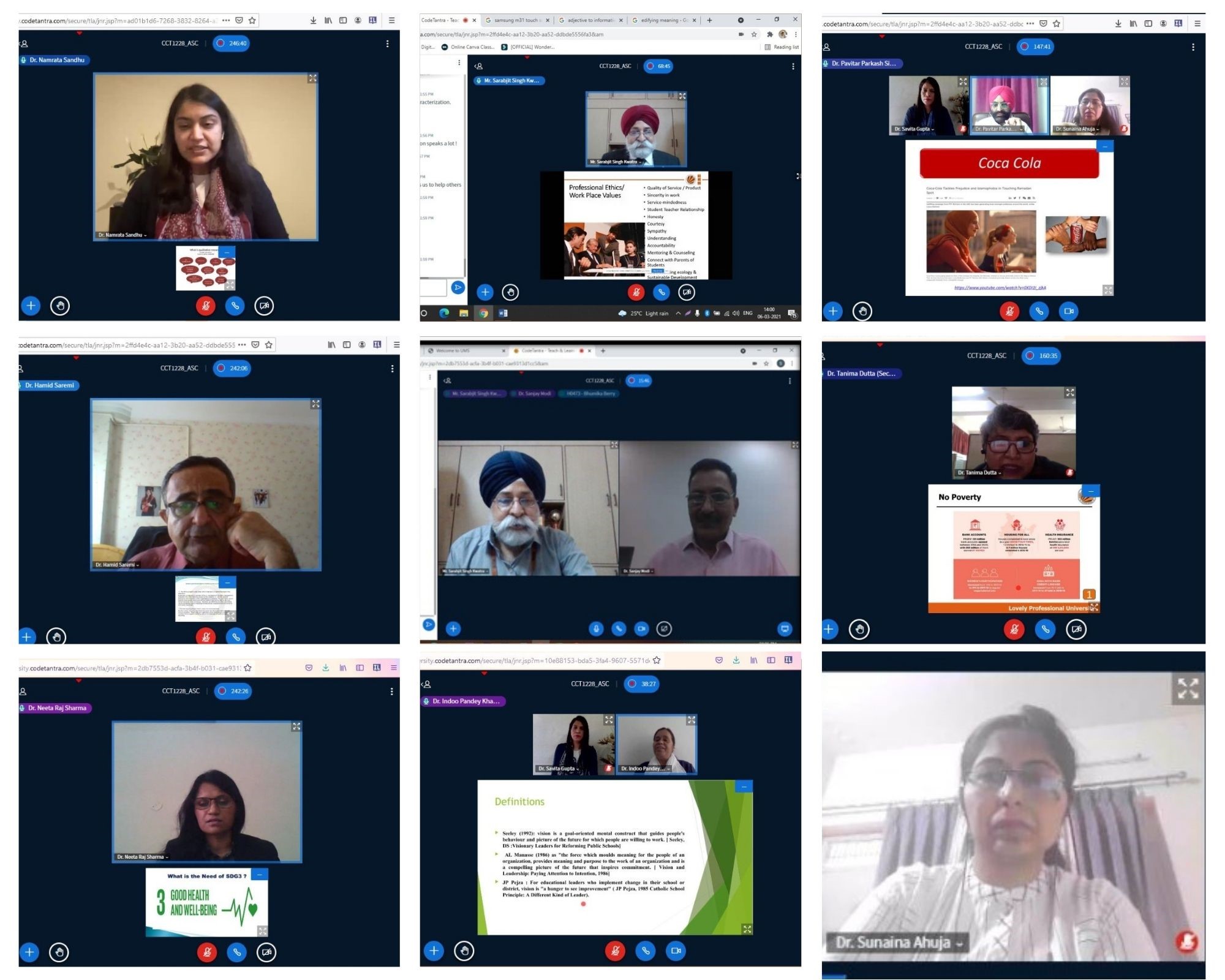
Dr. Hamid Saremi, President (Chancellor) Assrar Higher Education, Mashhad-Iran expressed his views onAnchoring Professional Ethics in Universal Values: Best Practices. Hedeliberated upon the ethical theories, business ethics and characteristics of professional ethics.
The ninth module titled “Environmental Consciousness and Sustainable Development Goals” focussed on awareness on Environmental Consciousness and Sustainable Development Goals (SDG) among participants and promote critical evaluation of the current status and future potential of India about SDG. Dr. Sanjay Modi, Professor and Executive Dean, Faculty of Business and Arts, Lovely Professional University deliberated on Sustainable Development Goals: Social Justice. He elaborated upon contributing to social justice by generating awareness about SDGs and engaging students in HEI”s and discussed the major problems of the world which need global focus. Dr. Modi also emphasized on Role of Education – Inclusion and Equity along with institutional strategies for ursuing SDG’s
Dr. Tanima Dutta, Associate Professor, Mittal School of Business, Lovely Professional University oriented the participants on Sustainable Development Goals: Economy. She discussed Sustainable Development Goals and analyse the performance of India in respect to SDG’s.
Dr. Neeta Raj Sharma, Professor & Additional Dean, School of Bio Engineering and Biosciences, Lovely Professional University focussed onSustainable Development Goals: Health and Environment. She elaborated on Sustainable Development & SDGs, Basics of Health, Environment and its components and Health & Environment Alliance.
The tenth module titled “Strategic Planning and Management” provided insights on dealing effectively with rapidly changing circumstances, improve internal management and institutional performance. Dr. Indoo Pandey Khanduri, Professor, Department of Philosophy, Central University -Hemvati Nandan Bahuguna Garhwal University sensitized the participants on Creating and Developing Shared Vision. She focussed on:
- Vision and shared vision
- What does it mean to have a vision/ shared vision?
- The major effects of having vision
- Steps for creating and developing shared vision
- Models: Education
Dr. Rajesh Verma, Professor & Dean, Mittal School of Business, Lovely Professional University deliberated on Strategic Planning: Preparing Vision /Mission Document at Institutional Level, developing a strategic thinking mindset and understanding what is involved in preparing Vision & Mission Document at Institutional Level.
Dr. Sunaina Ahuja, Professor and Associate Dean, Head-HRDC, Lovely Professional University concluded the module with Roadmap of Excellence with Strategic Vision with a focus on Organizational Vision for Excellence via Case Study and Personal Vision for Excellence. She discussed the concept of Wabi Sabi and shared a video on the future concept of Technical University of Munich (TUM). Reflecting upon Simon Sinek’s ideas on achieving excellence was key actionable points.
During Week 4 and 5 the participants were regularly provided the reading material relevant to the program curriculum and FIP sessions. As a part of the FIP assessment scheme, the participants were assigned two Quiz 2 was based on Personal-Emotional Development and Counselling and Quiz 3 was based on Research, Professional Development and Academic Leadership, Academic Integrity, Constitutional Values, Human Rights & Fundamental Duties, Environmental Consciousness and Sustainable Development Goals and Strategic Planning and Management.
Throughout Week 4 and 5 of GURU-DAKSHTA FACULTY INDUCTION PROGRAM, the sessions were conducted in a participative environment giving opportunities for open discussion, brainstorming and hands-on learning and used collaborative learning methods like Case studies, videos and quiz.
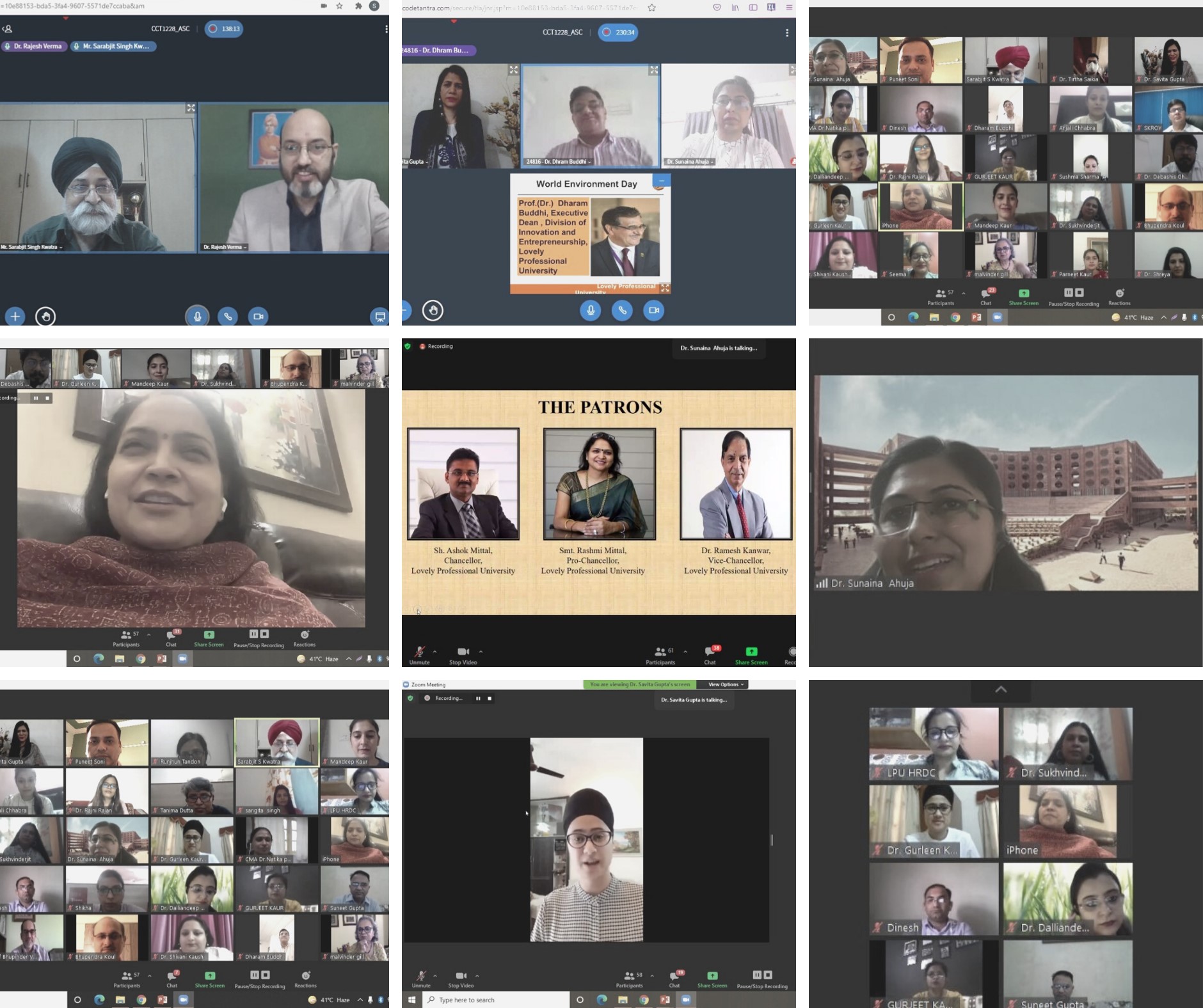
The thirty-day journey culminated on June 07, 2021 with 53 participants from 16 organizations PAN India. As per feedback received from participants, resource persons were highly resourceful, eloquent and articulate in putting across their viewpoints. The participants were not only appreciative of the rich content, their knowledge but also their wisdom and their lifetime experiences giving real life examples of the efforts they had put in their own areas of expertise and the bottlenecks they had faced. This gave the participants an insight on how to overcome such difficulties while in pursuit of their goals and missions and that is surely going to stand them in a good stead in the times to come.
Mrs. Rashmi Mittal, Pro-Chancellor, Lovely Professional University congratulated the participants and organizing team for this unique endeavour wherein experiential learning was effectively provided in an engaging manner. She appreciated the design of the curriculum which was in sync with the mission of Lovely Professional University and the fact that UGC guidelines 2019 were followed in letter and spirit. Lauding the efforts of HRDC, she said to keep organizing such meaningful capacity building programs.
The report was presented by Dr. Sunaina Ahuja, Professor and Associate Dean- HRDC thanking the patrons Sh. Ashok Mittal, The Chancellor, Mrs. Rashmi Mittal, Pro-Chancellor and the Dr. Ramesh Kanwar, the Vice-Chancellor. She also acknowledged the valuable contribution of the intellectual capital and appreciated the organizing team led by Dr. Savita Gupta, Course Coordinator, HRDC and Mr. Puneet Soni, Course Coordinator, HRDC. She acknowledged seamless efforts made by Team HRDC, particularly Ms. Sharanjit Kaur, Ms. Sushma, Ms. Seema Sharma, Ms. Jagdeep Kaur and Ms. Neha Sharma. Dr. Ahuja concluded that the course must have been a stimulating and invigorating experience for participants and will stand a good stead in their day to day teaching that will in turn immensely benefit their students.
The course intonates with the closing remarks of Course Coordinator, Dr. Savita Gupta thanking the resource panel, course conveners and the participants and acknowledged the efforts of the Organizing Committee.
An hour spent in the company of a scholar is worth reading a hundred books………..


